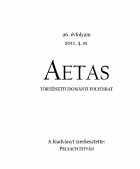Őfelsége katonája, Kádár alattvalója. Taróczy Nándor magyar királyi altábornagy életútja
His Majesty’s soldier, Kádár’s subject. The life of Nándor Taróczy, lieutenant-general of the Royal Army of Hungary
Author(s): László Varga E.Subject(s): History
Published by: AETAS Könyv- és Lapkiadó Egyesület
Summary/Abstract: Nándor Taróczy, lieutenant-general of the Royal Army of Hungary was born and raised, studied and begun his military career under the reign of King and Emperor Franz Joseph I. His second injury during World War I excluded him from field operations and he was moved to administrative services. He served in the occupied Serbian, Polish and Italian territories’ military governorships. He was 44 years old at the time of the collapse of the Austro-Hungarian Empire. From 1918 to his retirement in 1928, he served in the Royal Army of Hungary. While serving in the Kriegsarchiv in Vienna, he assisted the establish-ment of two divisions of the Polish army’s general staff, namely the military and counter-intelligence divisions and recruited secret agents to Poland in Czechoslovakia without any financial reward for himself. In the summer of 1920, during the decisive phase of the Polish-Soviet war it was to his proposition that the Polish, due to the Italian, Czech and Austrian railroad workers strike, requested the Hungarian government to allow the transportation of the war material from Western Europe through the territory of Hungary, thus ensuring the steady war material supply of Poland. Taróczy spoke four languages in addition to his own mother tongue. He foresaw the rise of the Soviet Union as a superpower in the first half of the 20th century and despised the decadency of the West. He was interested in political and social issues. Being able to speak in Russian, he succeeded to prevent the residents of his home district from being harassed by Red Army soldiers. In the 1950a, he was dispossessed of his villa, his pension was reduced and he had to work as a night watchman. Having outlived several political regimes, he died in Buda-pest at the age of 99 after a long and meaningful life.
Journal: AETAS - Történettudományi folyóirat
- Issue Year: 2011
- Issue No: 4
- Page Range: 61-81
- Page Count: 21
- Language: Hungarian

